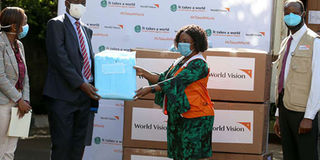Covid-19 battle now turns to small-scale vendors

Acting Health Director-General Patrick Amoth (left) receives personal protective kits from World Vision Kenya National Director Lillian Dodzo to help in the Covid-19 war, at Afya house on May 14, 2020. PHOTO | SILA KIPLAGAT | NATION MEDIA GROUP
What you need to know:
- The ministry extended the ban on movement in and out of Eastleigh in Nairobi and Old Town in Mombasa until June 6.
- The war received a boost after Kenya received two mobile laboratories from Germany through the German Development Bank.
Vegetable and fruit vendors will be tested for Covid-19 as the Health ministry strives to arrest spiralling infections, which crossed the 1,000-mark Wednesday.
The government suspects that the small-scale traders could be agents of community transmission of the virus.
Acting Health Director-General Patrick Amoth said the group will be tested next week.
“Most people visit mama mbogas for groceries and they are at risk of getting infected and infecting others because of the manner in which people touch the commodities,” Dr Amoth said during a coronavirus briefing in Nairobi.
The vendors are at high risk of contracting the virus since most of them still accept cash payments.
Health Cabinet Secretary Mutahi Kagwe appealed to the traders to ensure their clients do not touch and contaminate their produce.
“Assume that anybody entering your kiosk or touching your nyanyas (tomatoes) and sukuma wiki is positive and deal with the situation. Everyone you attend to should be wearing a mask,” Mr Kagwe said.
“We are only trying to see how we can reduce infections that can come from this group. Should one of them test positive, then it means a whole market can be quarantined or closed because we do not see them practising social distancing.”
BAN ON MOVEMENT
Kenya recorded the highest daily rise in new infections since March 13, with 66 cases.
The 43 males and 23 females found in 2,621 samples brought the national Covid-19 tally to 1,029.
The cases are spread in 10 counties, including Mombasa (30), Nairobi (26), Kajiado (three) with Busia, Nakuru, Kirinyaga, Makueni, Meru, Uasin Gishu and Kisii recording a case each.
In Nairobi, Kibra had the biggest spike with 15 infections, followed by Langata (three), Starehe and Dagoretti (two each), while Westlands, Eastleigh, Dandora and Mathare recorded a case each.
Mombasa’s cases were recorded in Likoni (10), Kisauni (eight) while Changamwe, Nyali, Jomvu and Mvita had three each.
In terms of age, the new patients were between 10 and 64 years. “With the increase in the number of infections, we have been able to keep our fatality rate at 5.6 per cent against the global average, which stands at 6.6 per cent,” Mr Kagwe said, adding that eight patients had left hospital, bringing the total recoveries to 366, while deaths continue to stagnate at 50.
Meanwhile, the ministry extended the ban on movement in and out of Eastleigh in Nairobi and Old Town in Mombasa until June 6.
MOBILE LABS
All eateries, restaurants and malls in the areas will remain closed and hawking prohibited until June 6.
The war on the coronavirus also received a boost Wednesday after Kenya received two mobile laboratories from Germany through the German Development Bank.
The labs will be taken to Namanga and Naivasha to boost tests on truck drivers. Mr Kagwe said the laboratories have modern equipment that can diagnose most pathogens that cause non-communicable diseases, including Covid-19 and Ebola, and have the capacity to test 2,000 people per day.
“They are really going to complement our existing laboratory network. We plan to have one lab stationed in Namanga on the Kenya/Tanzania border and the other in Naivasha,” the CS said.




